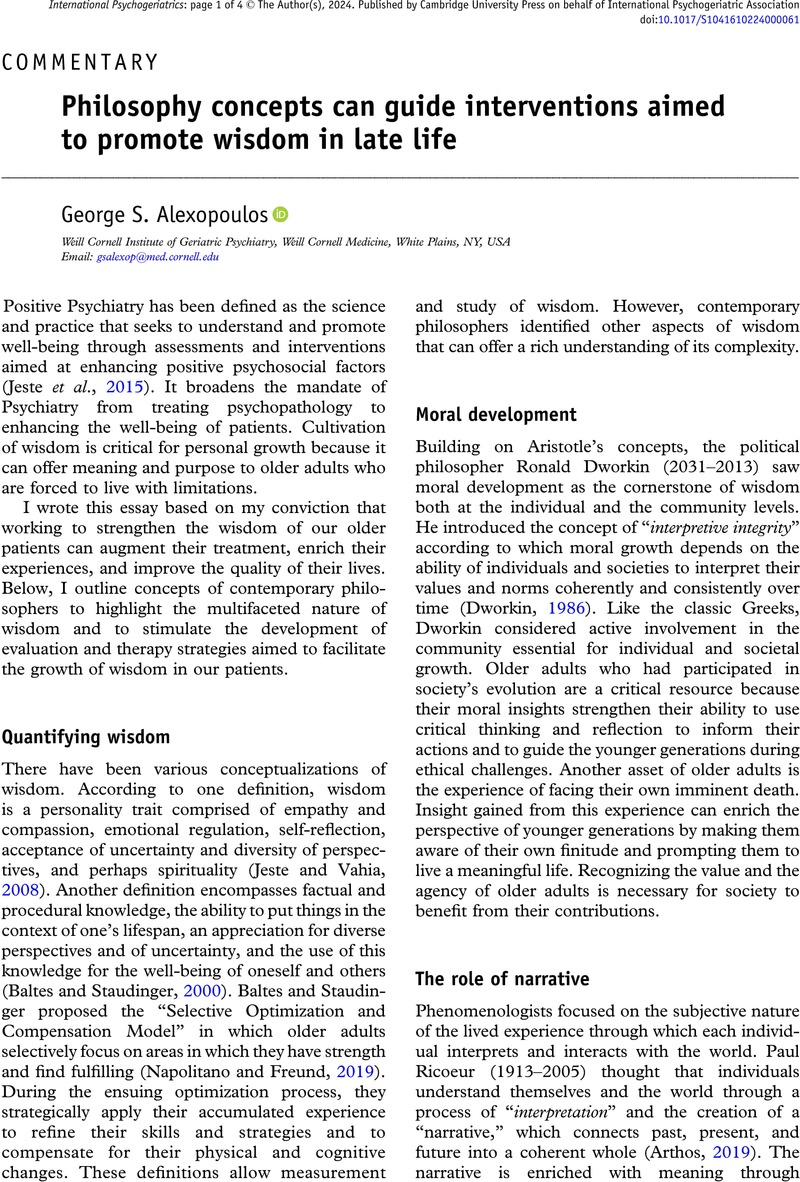No CrossRef data available.
Article contents
Philosophy concepts can guide interventions aimed to promote wisdom in late life
Published online by Cambridge University Press: 15 January 2024
Abstract
An abstract is not available for this content so a preview has been provided. Please use the Get access link above for information on how to access this content.

- Type
- Commentary
- Information
- Copyright
- © The Author(s), 2024. Published by Cambridge University Press on behalf of International Psychogeriatric Association
References
Abromeit, J. (2011). Max Horkheimer and the Foundations of the Frankfurt School. Cambridge University Press.CrossRefGoogle Scholar
Adorno, T., & Horkheimer, M. (2016). The dialectic of enlightenment. J. Cumming (Trans.). Verso.Google Scholar
Alexopoulos, G. S. (2023). The evolution of western philosophical concepts on social determinants of mental and medical health. International Psychogeriatrics, 23, 1–19. Online ahead of print. https://doi.org/10.1017/S1041610223004404
Google Scholar
Alexopoulos, G. S. (2023). What is the value of MRI-based models of geriatric psychopathology now that MRI findings are challenged? A view from epistemology. American Journal of Geriatric Psychiatry, 31(8), 553–558. https://doi.org/10.1016/j.jagp.2023.05.012
CrossRefGoogle ScholarPubMed
Alexopoulos, G. S. (2023). Artificial intelligence in geriatric psychiatry through the lens of contemporary philosophy. American Journal of Geriatric Psychiatry, 16. Epub ahead of print. https://doi.org/10.1016/j.jagp.2023.09.006
Google Scholar
Baltes, P. B., & Staudinger, U. M. (2000). Wisdom: a metaheuristic (pragmatic) to orchestrate mind and virtue toward excellence. American Psychologist, 55(1), 122–136.CrossRefGoogle Scholar
Heidegger, M. (1962). Being and time. J. Macquarri and E. Robinson (trans). Blackwell.Google Scholar
Jeste, D. V., Palmer, B. W., Rettew, D. C., & Boardman, S. (2015). Positive psychiatry: its time has come. Journal of Clinical Psychiatry, 76(6), 675–683. https://doi.org/10.4088/JCP.14nr09599
CrossRefGoogle ScholarPubMed
Jeste, D. V., & Vahia, I. (2008). Comparison of the conceptualization of wisdom in ancient Indian literature with modern views: focus on the Bhagavad Gita. Psychiatry: Interpersonal and Biological Processes, 71(3), 197–209.CrossRefGoogle ScholarPubMed
Lyotard, J. F. (1984). The postmodern condition. A report on knowledge. University of Minnesota Press.CrossRefGoogle Scholar
Napolitano, C. M., & Freund, A. M. (2019). The model of selection, optimization, and compensation. In Gu, D., & Dupre, M. (Eds.), Encyclopedia of gerontology and population aging. Springer. https://doi.org/10.1007/978-3-319-69892-2_109-1
Google Scholar
Neiman, S. (2015). Evil in modern thought: An alternative history of philosophy. Princeton Classics.Google Scholar
Rorty, R. (1989). Contingency, irony, and solidarity. Cambridge University Press.CrossRefGoogle Scholar
Santoni, R. E. (1995). Bad faith, good faith, and authenticity in Sartre’s early philosophy. Temple University Press.Google Scholar
Solomonov, N., Lee, J., Banerjee, S., Chen, S. Z., Sirey, J. A., Gunning, F. M., Liston, C., Raue, P. J., Areán, P. A., & Alexopoulos, G. S. (2023). Course of subtypes of late-life depression identified by bipartite network analysis during psychosocial nterventions. The Journal of the American Medical Association, Psychiatry, 80(6), 621–629. https://doi.org/10.1001/jamapsychiatry.2023.0815
Google Scholar




